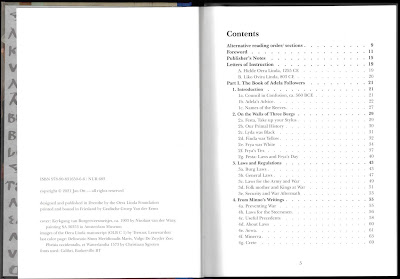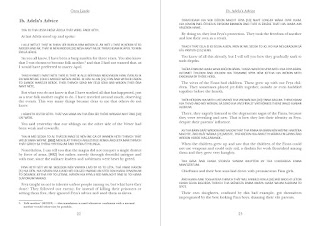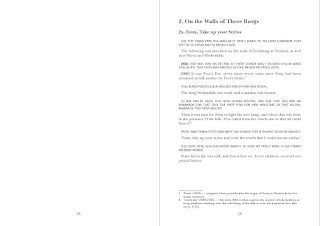In 1938, the manuscript known as The Oera Linda-book was given to the province Friesland by custodian and owner Cornelis Over de Linden, the fourth of that name, who was confident that "through Science the Truth will triumph over the mystery surrounding this manuscript".
 |
G.A. Wumkes
|
One year prior to the handover, in 1937, there had been attempts to set up a fund for publication of a facsimile edition of the manuscript, perhaps followed by various translations and new research. The then owner Cornelis Over de Linden was one of the initiators and a willing investor. Collaboration was sought with the Frisian Society for History, Archaeology and Language. (1) The provincial librarian, historian, theologian and member of the Frisian Society,
Geert A. Wumkes supported the initiative, (2) writing:
"It is less significant to me who wrote the Oera Linda-book. What matters is its inherent, spiritual value, as a testimony to the Westfrisian love of freedom at a time when the national character was threatened with utter destruction. Both its moral and literary quality, as well as the spirituality it expresses, I consider more relevant than authenticity and historical facts." (3)
However, four months later, in a reply of two sentences, the president of the Frisian Society, baron Pieter A.V. van Harinxma thoe Slooten, who was also the Queen’s commissioner for the province Friesland, informed the initiators that the Society refused to give any support, financially or morally. (4)
Wumkes had not been the only respectable advocate of Oera Linda's value, but he was one of the last who dared to openly praise it. The first and foremost had been Dr. Ottema, whose introduction to his first edition of 1872 was translated by William Sandbach in the 1876 English edition. This introduction will be known to most readers and remain accessible. A less well known introduction to Oera Linda, and perhaps a more notable one, for it was published by the same Frisian Society that would later so disdainfully reject it, is translated below.
- Friesch Genootschap van Geschied-, Oudheid- en Taalkunde; cooperation with the Westfries Genootschap (North Holland) was also intended.
- It was thanks to the efforts of Wumkes that Over de Linden would hand over the manuscript to the library in 1938. Wumkes is most well known for his Frisian translation of the complete Bible, published in 1943.
- Letter Wumkes to Molenaar, dated March 22, 1937 (original Dutch text here).
- Letter Harinxma to Molenaar, dated July 17, 1937.
Frisian Antiquities (1)
The Over de Linden family in Den Helder is in possession of an old manuscript, of which script, language and content were unknown. It had been passed on from generation to generation, with the advice to preserve it with care, as a family-treasure. They guessed it was written in Old-Frisian and suspected it might contain information about ancient ancestors.
When Dr. Eelco Verwijs, archivist-librarian of Friesland, heard about this, he informed the Dutch government, that commissioned him to examine it. On December 17, 1867, he reported his first conclusions and that the owner had given him permission to copy and translate the manuscript. [...]
Thanks to the persevering zeal and care of Dr. J.G. Ottema, the content was understood and translated. In detail he reported the results of his examination in a meeting of the Frisian Society on February 10, 1871. This report was printed and distributed, leading to a great public interest in this curious document.
In Ottema's opinion, the doubts that had risen about the manuscript's authenticity had no grounds. He saw it as a most important source of old Frisian history, revealing relevant new information. As he concluded: "We may thus accept that this manuscript, of which the oldest part was composed in the sixth century before our era, contains the oldest product (after Homer and Hesiod) of European literature. It describes an ancient people in our fatherland, thus far unknown, with a development, civilization, industry, navigation, trade, literature and pure, sublime religious values. In our imagination, our history did not reach beyond the arrival of Friso [c. 300 BC], the supposed Frisian founding father. Here however we discover a history beyond 2000 BC, surpassing the antiquity of Greece and equaling that of Israel."
The manuscript is a copy from 1256, (2) made by Hidde Oera Linda. In all debates about its authenticity and value, it was impossible to have a well-founded judgment, until the printed version was published in 1872. [...]
After publication, the book that was remarkable from any point of view remained a source of conflict and both sides of the debate sought to defend their belief. In 1973, Dr. Ottema explained the content in a brochure, titled Historical Notes and Clarifications to the Oera Linda-book, (3) and defended it a year later in The Royal Academy and the Oera Linda-book. (4) Dr. A.T. Reitsma from Groningen studied it and presented the results of his research in three meetings of the Frisian Society. (5) He concluded that the work has both internal and external marks of authenticity, and gave examples of its high historic value. In the last of these meetings the opponents also had the opportunity to raise their concerns. The manuscript itself was also displayed at that occasion, so the possible authenticity as 13th century copy could be judged.
The most extensive research thus far was reported in the Deventer newspaper in 1874 and later published separately, titled In response to the Oera Linda Book. (6) It is obvious that the author was someone knowledgeable and unprejudiced. His answer to the thought that the book would be a forgery, made after 1853, when the stilt-houses in lake Zürich were discovered, is: "Who then would be the author? Not just anyone would be capable of such a thing. Accurate knowledge would have been needed for that of the oldest Frisian language, of which a very limited vocabulary from only a few sources is available. Moreover, knowledge of how that language changed in the course of time. For remarkable differences can be noticed between the linguistic varieties used by the first and last composers of the manuscript. The forger would also have needed exceptional historic and geographic knowledge. It could not have been done without many years of preparatory studies. Writing the odd script would have been a drudgery. And what would all those efforts have been good for? Honor? — But forgers have good reasons to keep their name a secret. Money? — That publication would hardly cover printing costs could have been known beforehand. The pleasure of fooling scholars? — Would a very well-educated and talented man, as the assumed creator must have been, sacrifice so much time and effort in order to gain such questionable delight? None of all that is plausible.
"We thus face an odd dilemma: Either we allow ourselves to be fooled by the creation of a highly devoted, mad genius — or a great deal of old history is placed in such light, that a revolution in this field will become inevitable.
"You might then suppose it was the product of a bored monastic? This cannot be the case either. As we intend to explain, the Oera Linda-book teaches ethics and an understanding of God that are so ultimately true and pure, so unmonkish and untheologic, that someone, raised under the influence of Catholic or even Protestant dogmas, could impossibly have expressed such true free-thinking and entirely unbiased feelings."
And yet this scholar had to conclude: "Although nothing goes against the physical possibility; although we discovered nothing that convinces of a forgery, — still there is something suspicious about the parts that deal with Greek-Roman antiquity. We have no doubts about the honesty and frankness of the gentlemen Over de Linden and Dr. Ottema. If any element is forged, they were not involved — we are wholeheartedly convinced of that. We have suspicion, but it is not serious enough to outright reject the Oera Linda-book."
All things considered, we may call this book remarkable. As long as it will remain difficult, to distinguish myth, legend or embellished tradition in the earliest history of any nation, the Oera Linda-book — considered by some as a glorification of the Frisian race — will remain an object of meticulous research. Still, anyone who has read the book will have to admit, that the work contains inner marks of great value. Therefore we readily agree with the following statement by the Deventer scholar: "Although I have come to love the book with all my heart, I look forward to the results of scientific examination without concern. Because, even if it would be convincingly refuted on historic grounds, the book would still keep its great ethical value as an allegory or as fiction."
- Translated from the Dutch original (link to PDF). Full title: Friesche Oudheden — Afbeeldingen van Merkwaardige Voorwerpen van Wetenschap en Kunst, gevonden in de Archieven, Kerken, Kasteelen, Terpen enz. van Friesland (Frisian Antiquities — Depictions of remarkable objects of science and art, found in the archives, churches, castles, terps etc. of Friesland), published by the Friesch Genootschap (1875), pp. 48-50 Het schrift van het Oera Linda-Bok, with a depiction of page 45 of the manuscript.
- The 1256th year should have been read as the year 1255.
- Original Dutch title: Geschiedkundige aanteekeningen en ophelderingen bij Thet Oera Linda Bok. A revised and more extensive edition was published with the same title in 1878.
- Original Dutch title: De Koninklijke Akademie en het Oera Linda Boek.
- Dr. Anne T. Reitsma was theologian, pastor and one of the founders in 1838 of the Frisian Theologian Society, which he gave its motto: Truth in Freedom.
- Full title: Naar aanleiding van Thet Oera Linda Bok — Historische schetsen met enige in- en uitvallen (1874), translated in German as Historische Skizzen auf Grundlage von Thet Oera Linda Bok (1875); although it was published anonymously, it was clear that the author was prof. Annes J. Vitringa, school director and author of articles and books, most significantly Darwinia (1876) about a monstrous world as he believed it would look like if Darwin's teachings were truly applied.





































